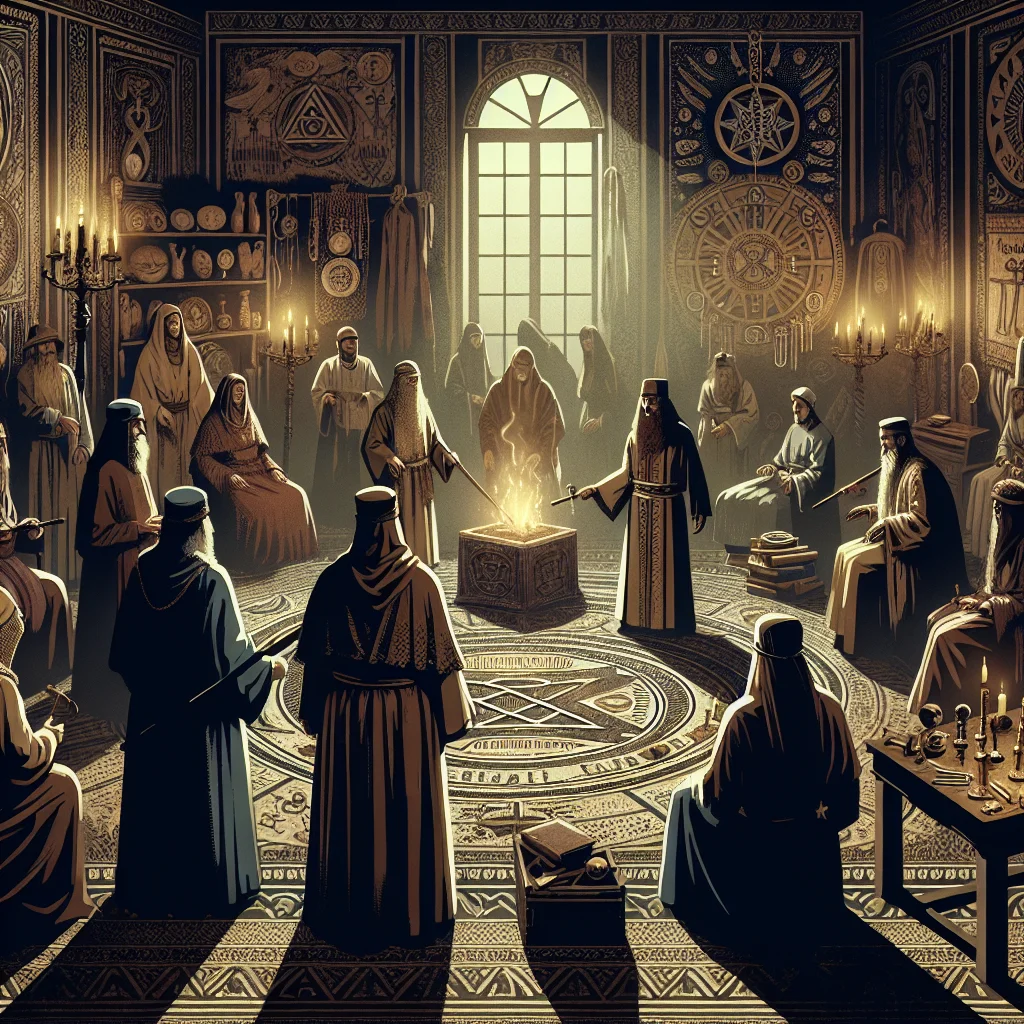As an Amazon Associate I earn from qualifying purchases.
↻
Last updated: December 24, 2025

The concept of witchcraft has been present throughout human history, but its specific portrayal and condemnation in the Judeo-Christian tradition can be traced back to texts written thousands of years ago. For many Christians and Jews, the Bible is a foundational text, and it is within the books of the Old Testament that one of the earliest known references to witchcraft appears.
In the Bible, the book of Exodus is often cited for its verse “Thou shalt not suffer a witch to live” (Exodus 22:18, KJV), encapsulating the hostile view toward witchcraft that permeated ancient Hebrew culture. This sentiment is mirrored in other parts of the Old Testament, such as Leviticus and Deuteronomy, which include ordinances against sorcery and divination. The context of these prohibitions is rooted in the strong monotheistic belief of the Israelites, who considered witchcraft and the invocation of other gods or spirits as a direct affront to the sovereignty of their God, Yahweh.
Interestingly, while many associate the Bible with the condemnation of witchcraft, the Hebrew word often translated as “witch” is “kashaph,” which means to whisper a spell or to enchant. This linguistic note adds complexity to the understanding of what activities might have been considered witchcraft in ancient times. It also highlights that the interpretation of the term evolved over time as the Bible was translated into different languages.
In the New Testament, the apostle Paul writes to the Galatians listing “witchcraft” (in Greek, “pharmakeia”) among the works of the flesh that are to be renounced. The historical context of this empowers the notion that early Christians continued to view witchcraft as incompatible with their faith. Nevertheless, this concept, like many biblical ideas, was subject to interpretation and was shaped further by cultural and historical developments throughout the centuries.
A startling statistic that underscores the lasting impact of the biblical origins of witchcraft is the European witch trials of the 15th to 18th centuries, when an estimated 40,000 to 60,000 individuals were executed for witchcraft. Many of these witch trials were justified by the Bible’s admonitions against witchcraft, demonstrating how interpretations of religious texts can have profound and often tragic real-world consequences.
`
Where Did Witchcraft Originate According to the Bible? Unveiling Historical Roots
`
Witchcraft, as depicted in the Bible, is often associated with the practice of magical arts and seeking knowledge or power through supernatural means, which is generally portrayed as contrary to the will of God. While the exact origins are not precisely dated, the Bible refers to acts that could be considered witchcraft in various books, such as Deuteronomy, 1 Samuel, and Exodus, often condemning these practices. For instance, the Witch of Endor, who summoned the prophet Samuel's spirit in 1 Samuel, is a famous biblical reference to such practices. These scriptural instances reflect ancient views on witchcraft, emphasizing its existence and opposition within the societal and spiritual context of Biblical times. To delve deeper into the historical and theological context of witchcraft in the Bible, the following sections will explore the verses, stories, and cultural implications that have shaped our understanding of where witchcraft began in the Judeo-Christian perspective.
When tracing the biblical origins of witchcraft, references mainly revolve around ancient texts predominantly found in the Hebrew Bible, or what is more commonly known in Christian contexts as the Old Testament. One of the earliest mentions of practices that could be associated with witchcraft is found in the book of Exodus, specifically Exodus 22:18, which states, “Thou shalt not suffer a witch to live.” This stark commandment reflects the perspective of witchcraft at the time, a practice that was viewed with deep suspicion and considered antithetical to the faith and law of the Israelites.
The term “witchcraft” as seen in the Bible is often an interpretation of the Hebrew word “kashaph,” which is derived from a root meaning to whisper a spell or enchantment. This indicates that biblically, witchcraft is tied to the act of using spoken spells or charms as a way to manipulate or harness supernatural forces. It's important to note that the exact nature of what constituted witchcraft in these ancient texts is a matter of interpretation and the term may include a range of practices from divination and sorcery to enchantments and spirit interactions.
Another significant passage is found in the book of Deuteronomy 18:10-12, which includes a warning against anyone who practices divination, a soothsayer, an augur, a sorcerer, a charmer, a medium, a wizard, or a necromancer. These varied labels indicate there were a number of practices that the ancient Israelites would have understood as part of the broad category of witchcraft or forbidden magical arts. These practices were perceived as defilements and abominations, likely because they stemmed from neighboring cultures with differing religious systems.
The book of 1 Samuel recounts the tale of King Saul consulting the Witch of Endor to summon the spirit of the deceased prophet Samuel. This event, though it depicts witchcraft in action, also serves as a clear example of the disdain and prohibition against such practices. Saul himself had previously expelled mediums and wizards from the land, demonstrating the inconsistency and ultimate tragedy of his kingship.
The New Testament also contains references to witchcraft, or what might be labeled as sorcery. In Galatians 5:19-21, the apostle Paul includes witchcraft, translated from the Greek “pharmakeia” (from which we derive the word pharmacy), in a list of “works of the flesh” that are condemned for Christians. This places witchcraft among a catalogue of behaviors and practices that are viewed as opposed to the spirit of Christian living.
Where did witchcraft originate biblically is thus not a straightforward question, as the Bible does not offer a point of origin in a narrative sense. Rather, it is repeatedly presented as a series of practices that have pre-existing ancient origins absorbed from surrounding cultures during biblical times. These practices are identified and rejected throughout scripture as being opposed to the religious and societal norms within the Hebrew Bible and later, the Christian New Testament teachings.
Although the Bible remains one of the primary texts cited in discussions about the origins and history of witchcraft, contemporary historical and anthropological research has broadened the perspective on where and when such practices developed extensively beyond biblical narratives, leading to a more comprehensive understanding of the context and evolution of witchcraft across different cultures and epochs.
In terms of modern statistics, the Pew Research Center in 2014 found that globally, 34% of people in the Americas and 13% of Europeans surveyed believed in witchcraft, reflecting its ongoing cultural relevance and the persistence of such beliefs in contemporary society.
Frequently Asked Questions
1. What is the biblical definition of witchcraft?
In the Bible, witchcraft is often associated with practices involving sorcery, divination, and the invocation of spirits. It is portrayed as an abomination and contrary to the worship and commandments of God, as reflected in passages like Deuteronomy 18:10-12 and Galatians 5:19-21.
2. Where is the first mention of witchcraft in the Bible?
The first explicit mention of witchcraft in the Bible appears in the book of Exodus (Exodus 22:18), where it is condemned and punishable by death.
3. Does the Bible mention any specific witches?
Yes, the Bible references specific individuals associated with witchcraft, such as the Witch of Endor, who appears in 1 Samuel 28:3-25, where she conducts a séance to summon the spirit of the prophet Samuel for King Saul.
4. What was the biblical punishment for practicing witchcraft?
Biblically, the punishment for practicing witchcraft was severe, often resulting in death. Exodus 22:18 states, “Thou shalt not suffer a witch to live,” reflecting the zero-tolerance stance on witchcraft in ancient Israelite law.
5. How does the Bible distinguish between prophets and those who practice witchcraft?
Prophets in the Bible are considered to be messengers of God, receiving divine revelations and visions to guide and instruct people, while those who practice witchcraft are usually seen as using supernatural powers or knowledge that does not come from God, often for personal gain or to manipulate events.
6. Are there different types of witchcraft mentioned in the Bible?
The Bible mentions various forms of practices considered witchcraft, like sorcery, divination, enchantments, and consulting with familiar spirits, all of which are condemned as detestable practices.
7. How does the New Testament view witchcraft?
In the New Testament, witchcraft is included in lists of sinful behaviors, such as in Galatians 5:19-21, where it is referred to as “the works of the flesh” and considered incompatible with the kingdom of God.
8. Is there any distinction between witchcraft and magic in the Bible?
The Bible does not rigorously distinguish between witchcraft and magic, as both involve practices and powers that exist outside the worship and commandments of God and are thus condemned.
9. Did the belief in witchcraft have any historical impact due to its biblical origins?
Yes, the belief in witchcraft as presented in the Bible influenced religious, legal, and social perceptions, often leading to witch trials, executions, and widespread fear of witches in various periods of history, especially in Medieval Europe and colonial America.
10. Are there modern interpretations of biblical witchcraft which differ from historical views?
Modern interpretations often approach biblical references to witchcraft with a more nuanced perspective, considering historical and cultural contexts, and in some cases re-evaluating or rejecting the concept of witchcraft as it was traditionally understood in the biblical texts.

Conclusion
The exploration of the Biblical origins of witchcraft traced back to the ancient texts and belief systems that encapsulated the early Hebrew conception of sorcery and divination. Witchcraft, as depicted in the scriptures, is often associated with rebellion against God's commandments, a form of idolatry, and a breach of the natural order as established by the Divine. The Bible's pivotal references start in the Torah, specifically in the books of Exodus and Deuteronomy, where prohibitions against sorcery and witchcraft are explicitly stated, labeling the practice as an abomination. Through the narratives of Saul's encounter with the Witch of Endor, along with warnings in Leviticus, the origins of witchcraft in the Bible are closely intertwined with the cultural and religious context of ancient Israel, reflecting broader ancient Near Eastern dispositions regarding the supernatural.
Insights gleaned from the article suggest that witchcraft in the Biblical sense was deeply rooted in the spiritual struggle between adhering to the monotheistic worship of Yahweh and the alluring, yet forbidden, practices of neighboring pagan cultures. The figure of the witch, as mentioned in Proverbs and the Wisdom literature, serves as a metaphor for wisdom gone awry and the perilous allure of knowledge and power outside the bounds of divine approval. Significantly, the Biblical narrative does not provide a comprehensive treatise on witchcraft; rather, it sets forth a series of cautionary tales and legal proscriptions that shape a theological stance against such practices. Thus, the origins of witchcraft within the Biblical texts function as both a concrete denunciation of specific behaviors and a symbol of the broader human propensity towards spiritual infidelity.
Amazon and the Amazon logo are trademarks of Amazon.com, Inc, or its affiliates.
Continue Your Magical Journey
Free Witchcraft Starter Kit
Get 6 free printable PDFs: grimoire pages, moon calendar, spells, crystals, herbs, and tarot journal.
We respect your privacy. Unsubscribe anytime.
Enhance Your Practice
As an Amazon Associate, I earn from qualifying purchases.

